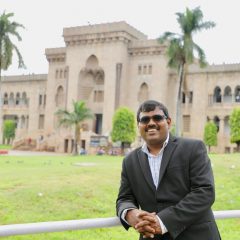 History Professor Chinnaiah Jangam was recently interviewed following the Toronto District School Board’s decision to look into caste-based discrimination. The full article, “‘Historic’ motion to address caste discrimination being considered by Toronto District School Board” by Shlok Talati can be found online with a short excerpt below.
History Professor Chinnaiah Jangam was recently interviewed following the Toronto District School Board’s decision to look into caste-based discrimination. The full article, “‘Historic’ motion to address caste discrimination being considered by Toronto District School Board” by Shlok Talati can be found online with a short excerpt below.
The Toronto District School Board (TDSB) will vote on a motion to address caste-based discrimination in the district on Wednesday. If the motion passes, it will become the first ever formal mechanism in Canada to address caste discrimination.
“That’s what makes this motion really important and almost historic,” says Yalini Rajakulasingam, the TDSB trustee who put the motion forward. “I am sure it will be the first of many to come.”
According to the motion, there is a recorded rise in caste-based discrimination within the South Asian diaspora and in Toronto. It directs the school board to form a working group — composed of people from oppressed castes — that would define caste-based discrimination, lead curriculum development on caste-based discrimination, and support the professional development of TDSB staff.
It also recommends that caste-based discrimination as a system of power and oppression be included in the school board’s Multi-Year Strategic Plan when it is up for review.
The caste system is a rigid South Asian social structuring system that has existed for thousands of years, and separates people into different social groups, or castes, based on a hierarchy. People in communities that follow a caste system are assigned a caste at birth. A person’s caste can primarily be identified by their last name, family background, food habits, occupation or racial profile. People in “lower castes” can be relegated to jobs that are deemed menial, as well as lower social status. The system is considered to be a litmus for purity. Those at the bottom of the hierarchy — who fall outside the four main categories of Brahmins, Kshatriyas, Vaishyas, and the Shudras — are called Dalits or “untouchables.”
Chinnaiah Jangam, associate professor in the history department at Carleton University and author of the book Dalits and the Making of Modern India, says the cultural upbringing of dominant caste groups in India places caste sociality at the centre of their lifestyle.
“Their everyday life itself is embedded into the idea of caste,” Jangam says.